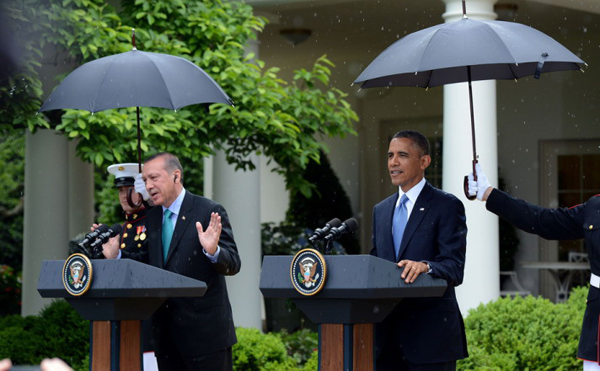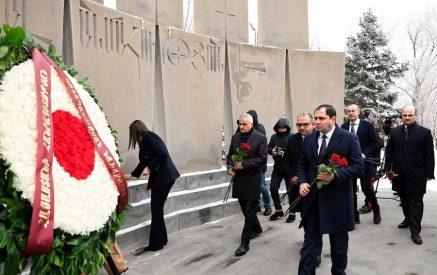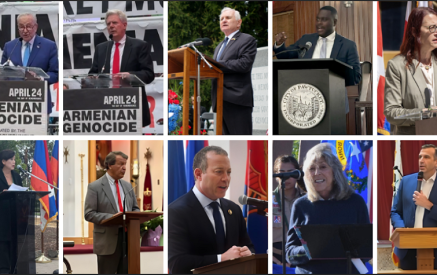And as a rule, after April 24 we are disappointed
In early April, the Chairman of the U.S. Senate Foreign Relations Committee, representative of Democratic Party Robert Menendez and the Republican Senator Mark Kirk introduced new Armenian genocide Resolution, which outlines that the United States President should work toward an Armenian-Turkish relationship based on Turkey’s truthful acknowledgment of the Armenian Genocide. The Resolution calls on the United States President to work on Armenia-Turkey relations towards equity, constructive, stability, and enhancement, including that the Turkish government fully recognizes the Armenian Genocide.
On April 10, the U.S. Senate Foreign Relations Committee adopted the resolution on the Armenian Genocide. The resolution after being passed by the Senate Foreign Relations Committee shall be debated in the Senate session. A parallel Resolution on recognizing the Armenian genocide was introduced in U.S. House of Representatives, to which 50 congressional representatives joined.
One day later, the U.S. State Department spokesperson Jen Psaki, referring to the Resolution on the Armenian Genocide passed by the U.S. Senate Foreign Relations Committee, said, “We clearly acknowledge as historical fact and mourn the loss of 1.5 million Armenians who were massacred or marched to their deaths in the final days of the Ottoman Empire. These horrific events resulted in one of the worst atrocities of the 20th century, and the United States recognizes that they remain a great source of pain for the people of Armenia and of Armenian descent, as they do for all of us who share basic universal values”.
Read also
At the request of the journalists, referring to Armenia-Turkey Protocols and Armenia- Turkey normalization process, Psaki noted that the U.S. continues to urge both sides to work together to achieve the full, frank and just recognition of facts. “We believe that by working together to address their shared history, Armenia and Turkey can promote stability and prosperity in the entire Caucasus region, so we continue to work with them on that.” As said by the Spokesperson of the U.S. Department of State, though there is no progress recorded on protocols, their greatest interest on this issue is to see Armenia and Turkey move forward together in a shared future of security and prosperity in the region.
As could be expected, Ankara reacted solid to the adoption of Genocide Resolution. Turkish Foreign Minister Ahmet Davutoğlu had a phone conversation with U.S. Secretary of State, John Kerry, assuring, “The Turkish government is take measures against the initiatives that can bother Turkey. We hope that they will not take such an attitude.” Later, the Turkish Foreign Ministry announced that by adopting this resolution on Armenian Genocide, the Committee has come out of the scope of its jurisdiction. The official Ankara considers the adoption of the Resolution on Genocide as a “political manipulating, which distorts the history and the law,” and condemns “those who lead this biased initiative, which is devoid of any legal basis.”
Ankara assures that through the Armenian-Turkish dialogue, the possibility of “achieving a fair memory of tragic events of 1915 happened during the great human sufferings of the World War I” is “thoroughly investigated and in all its dimensions.” “In the context, our recommendation to establish a Joint Committee on History, which is also reflected in the Turkish-Armenian protocols, is still on the agenda,” announced the Turkish Foreign Ministry. Ankara also advises the U.S. Congress to focus the efforts on “strengthening the historic alliance and partnership” between America and Turkey, which is “more important than ever under the present circumstances”, instead of damaging bilateral ties and to prevent the further progress of drafts of this and other similar resolutions.
Ahead to April 24, the draft of the resolution introduced in the U.S. House of Representatives, and later in the Senate Foreign Relations Committee, which calls on the U.S. President to view the Armenian-Turkish relationship on the bases of full acknowledgement of the Armenian Genocide by Turkey as a result of lobbying work, of course, is positive, however, it would be naive to think that the US-Turkish relations are put in doubt as a result of this draft.
Generally, we seem to be accustomed to being excited to pre-April 24 good news for us, later, being disappointed after April 24. As in previous years, this year on April 24, events commemorating the 99th anniversary of the Armenian Genocide will be held in different countries in the world, even in Turkey; protests will be held in various capitals in front of the Turkish diplomatic missions. Like every year, this year too, with our entire nation we will wait to hear whether the U.S. President Barack Obama, in his annual message on the 1915 Armenian Genocide, will pronounce the word genocide, but this year, he will again use the expression «Meds Yeghern», which is the protocol of the same genocide fact for us, Armenians.
Ahead to the Genocide 100th anniversary, what successes are we recording today as an independent and sovereign state? Do we have achievements towards the importance of Armenia at least in our region, and the increase of the influence…? Looks like the exact opposite, we joined the membership of the Customs Union for “the Russians to save us from Turks” and “keep our borders safe”…
EMMA GABRIELYAN






















































